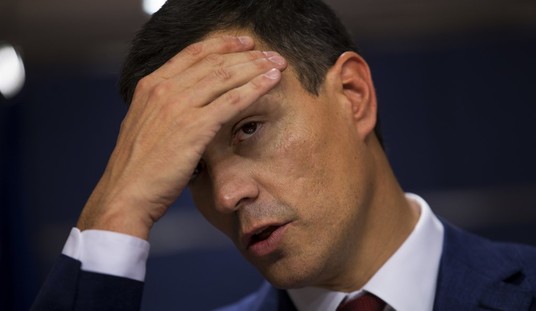Sunday’s lead story in the New York Times (“Spy Agencies Say Iraq War Worsens Terrorism Threat“) carries the newspaper’s tradition of utilizing anonymous sources to the edge of self-parody. “More than a dozen United States government officials and outside experts were interviewed for this article,” the fifth paragraph begins, “and all spoke only on condition of anonymity because they were discussing a classified intelligence document.” [itals. mine, obviously]
Reporter Mark Mazzetti is referring to a National Intelligence Estimate none of whose details are revealed in the story, although the details would seem to be the very devils upon which this analysis depends. Never mind – it appears to be the Times’ practice to present veiled editorials on their front page despite a pledge to be more stringent in the separation of news and opinion (see Byron Calame in their own “Week in Review” section for Sunday). Never mind too that this particular piece, based on an intelligence review from April, suddenly appears at the height of a political season. We have come to expect this. All’s fair in love and war, as they say. But just don’t expect to be considered the newspaper of record or anything close. There’s no such thing and never should be. The Times is just another representative of a specific “class interest,” albeit an especially potent one.
Still the question raised by this April study is an important one, indeed seems to me the heart of the matter. How do we judge our policies and actions in the War on Terror? This is no easy matter. We Westerners live in a McLuhan-Warhol culture that exists for the moment, hurtling into the future in increasingly rapid bursts or bytes. We want answers – now, now, now. Then, on to the next. Our adversaries, most of them anyway, couldn’t be less interested in that. They are living out (“acting out”?) a Seventh Century belief system that, even when appropriating our technology, looks backwards to the imposition of a caliphate with religious law. We are a short haul civilization; they are an ultra long haul one.
The implications of this distinction are, I would think, immense and increase the difficulty in determining just how much the Iraq War fanned the flames of Islamism. The conventional wisdom is that this strain, if it is a strain, of Islam comes in waves. The same CW has it that the current version evolved from the ideas of Sayed Qtub, the Egyptian who spent some time in the United States and didn’t like what he saw. He played on the disaffections of his society, the failures of Nasserism, etc, which gave rise to the Muslim Brotherhood, which in turn metastasized to Al Qaeda and others and so it went.
I imagine this is true to some extent. But I suggest this view is also a Western (short haul) one and ignores the continuing and basically unchallenged doctrines of Islamic jihad referred to recently by Pope Benedict (for which he was attacked in a New York Times editorial). One of the problems here – and I am, like the Times’ Mazetti, at a distinct disadvantage not having read the intelligence report – is that by assuming that we are the ones who most fan the flames of Islamism we do not take the Islamists seriously. We are in a sense solipsistic and racist. Obviously jihad is a very powerful doctrine. It has lasted for fifteen hundred years – the terrorists of the Atocha Station cited the reconquista as their motivation – and is still growing in adherents, a record other extremist doctrines (Marxism-Leninsim, Nazism) should envy.
Looked at from that angle, the Iraq conflict is not more than a blip in a long war. In fact, you could argue that it brought to a head what was already inevitable and that it has hastened the resolution of this hugely difficult historical problem. [To be followed by the next one Herr Hegel?-ed. Of course.] Am I making that argument? Not necessarily. I just don’t know. But what does intrigue me at the moment, far more than the predictable political posturing of our leading newspaper, is the role of the Pope. He has challenged Islam on religious grounds to reform the doctrine of jihad and forever remove its violent component. Interestingly, the reaction on the vaunted Arab Street has been relatively subdued, nothing by comparison into the orgy over a few banal cartoons some months ago. I would suggest to the editors of the Times that they examine this. The Pope’s bold criticism of jihad may not fit their narrative, but it is proving to be one of the more heartening events in some time, ultimately far more “progressive” than anything offered by the newspaper.
UPDATE: PJ has more, including White House reaction to the Times.
MORE form the invaluable Spook86, a blogger you should bookmark, if you haven’t/









Join the conversation as a VIP Member